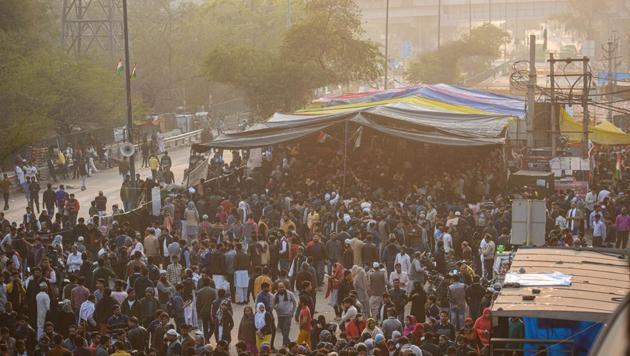Can’t block a public road indefinitely: SC on Shaheen Bagh stir
The bench, however, said that it did not want to take a call on the two petitions without hearing the government first. The petitions were filed by lawyer Amit Sahni and Delhi Bharatiya Janata Party (BJP) leader Nand Kishore Garg.
The protesters at Shaheen Bagh cannot block the road indefinitely and protests and demonstrations should happen in designated areas, the Supreme Court on Monday remarked in a case seeking the lifting of a road blockade on the Shaheen Bagh-Kalindi Kunj stretch in the Capital.

The bench of justices Sanjay Kishan Kaul and KM Joseph sought the response of Delhi Police and the central and Delhi governments, but declined to order immediate removal of the people who are protesting against the controversial Citizenship (Amendment) Act, or CAA.
“You cannot block public road indefinitely. If everybody starts protesting everywhere, then what will happen?” justice Kaul remarked.
The bench, however, said that it did not want to take a call on the two petitions without hearing the government first. The petitions were filed by lawyer Amit Sahni and Delhi Bharatiya Janata Party (BJP) leader Nand Kishore Garg.
“If you can wait for 50 days, you can wait for one more week,” the court said when the petitioners pressed for interim relief. It posted the matter for further hearing on February 17.
The protesters at Shaheen Bagh are opposing CAA — passed in Parliament’s winter session in December — which accelerates the path to naturalisation for members of the Hindu, Sikh, Buddhist, Jain, Parsi and Christian communities from Afghanistan, Bangladesh or Pakistan who came to India before 2015.
The legislation has become controversial because it links citizenship with religion and because it leaves out Muslims.This has led to widespread protests across the country, along with stirs against a proposed all-India National Register of Citizens (NRC), and the potential problems of the two working in combination.
Shaheen Bagh has been the epicentre of such protests in the Capital.
Sahni, in his plea, stated that the road closure at Shaheen Bagh causes great inconvenience to public at large. The plea added that the closure and the consequent traffic diversions have led to the wastage of precious time, energy and fuel, besides overburdening the Delhi-Noida flyway, Akshardham and Ashram routes.
The Kalindi Kunj road, Sahni argued, is a vital artery since it connects three states — Delhi, Uttar Pradesh and Haryana — and the road closure has led to huge difficulties not only for the residents of the area but millions of commuters.
Sahni stated that while people have the right to protest, the same is subject to reasonable restrictions and protesters cannot be allowed to occupy public roads indefinitely.
“No one can be permitted to occupy the public road for any reason whatsoever under pretext of peaceful protest and that too for indefinite period to make other suffer for the same…the fundamental right of the protestors do not exist in isolation in a watertight compartment. One fundamental right of a person may have to coexist in harmony with the exercise of another fundamental right by others,” the petition said.
Sahni’s plea was rejected by Delhi high court on January 14, stating that it is the responsibility of the police to maintain law and order and court cannot issue directions to the police on how to handle agitation, protest or traffic at the place of protest.
When the plea came up for hearing last week, the top court deferred it citing Delhi elections, hinting that it did not want its observations or decision to impact the polls, in which it became a major issue, particularly in the BJP’s campaign.
Meanwhile, another bench headed by Chief Justice of India (CJI) SA Bobde on Monday issued notice to the central and Delhi governments in a suo motu case on the participation of children in demonstrations and protests.
This case came to be registered after a 12-year-old Mumbai girl wrote to the CJI, highlighting the fate of the four-month-old Mohammad Jahan, who died January 30, reportedly after he was taken to Shaheen Bagh protests by his mother every day.
In her letter to the CJI, Zen Gunratan Sadavarte, a recipient of Indian Council for Child Welfare National Bravery Award 2019, urged the court to direct authorities to stop involvement of infants and children in demonstrations and protests. She also sought a police probe into the death of Jahan.
When the case was taken up for hearing on Monday, lawyers representing some women protesters raised the issue of discrimination faced by their children at schools and detention of children at camps.
A lawyer appearing for three women said, “Children come home from school crying because they are called Pakistanis and terrorists.”
CJI Bobde, however, refused to entertain those arguments stating that it is completely unrelated to the case.






